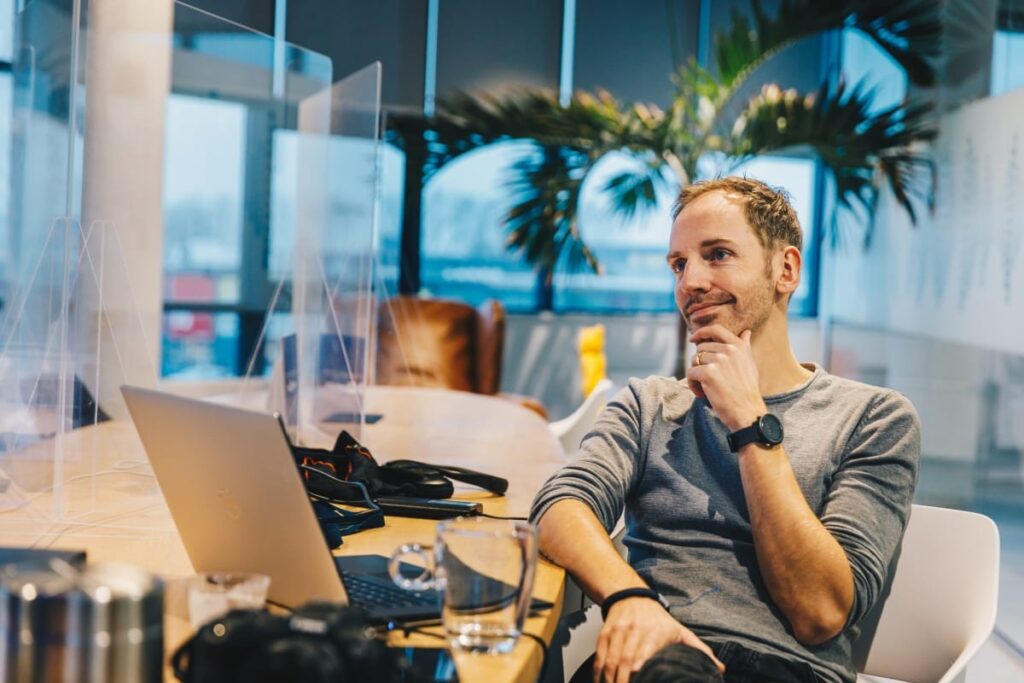
Do you enjoy reading Mark’s articles? Sign up for his founder’s newsletter now and stay up to date with his latest writings.
You have been hearing about AI everywhere. About kids letting an AI do their homework; about AI generating art based on the work of existing artists, and about AI writing computer code. You will also have heard about tools and companies like OpenAI, Midjourney, and ChatGPT.
This blog is not about the latest AI developments. I won’t be diving into hype vs reality. I’m not even going to talk about tools. I want to zoom out, because that is where things get interesting.
What will be the impact of AI on our society?
Because the potential impact of AI is huge, we have to make fundamental system changes if we all want to benefit from it. To understand why the impact can be so significant, we have to go back in time.
Between 1870 and 1970, there was an incredible fiftyfold increase in productivity, with a corresponding increase in human welfare.

The gains for most were tremendous:
- Workweeks went from 68 to 40 hours
- The average lifespan nearly doubled from 40 to 80 years
- We have seen wonderful technologies like cars, washing machines, plumbing, heating/cooling, penicillin, airplanes, and electricity
- And we have increase worker safety hundredfold
These benefits were mostly felt in western society.
You would have expected that the computer and smartphone revolution and digital knowledge work would lead to a new fiftyfold boom. This was also what was expected. This is what the MIT AI pioneer Marvin Minsky predicted in 1970:
In from three to eight years, we will have a machine with the general intelligence of an average human being.
We could have been:
- Working even fewer hours
- Working how, where and when we want
- Experiencing more freedom and passion in our work
The problem is, we did not see a new fiftyfold productivity boom, and where productivity grew, compensation for it did not. Michael Simmons wrote a wonderfully extensive piece on productivity which I highly recommend if you want to read more.

Productivity increased almost linearly since the ‘50s but wages did not, with the benefits of the wealth creation not ending up in the general population. The truth is that the technological revolution we have seen since the 1970s has made the rich very rich. Wealth gained ended up with the shareholders.
Since the 1970s we have seen stagnation of our development in multiple areas:
- Prices of energy are actually increasing
- Healthcare costs are increasing
- CO2 levels are on a permanent rise
- Extreme poverty is on the rise
Now, how is this history of Industrialization and productivity connected to AI? Well, I see the potential of AI to change this. This has to do with a Twitter thread from Richard Ngo, one of the researchers working at OpenAI. He makes a list of predictions, and this is an important one:
An AI will be able to beat any human on any computer task a typical white-collar worker can do in 10 minutes.
And his predictions feel very realistic compared to the claims I see other researchers make.
The main thing I expect AI to do is augment knowledge work and give us the next productivity wave for desk workers. What the industrial revolution did for manual labor, AI will do for the knowledge worker.
Knowledge workers make up 25% of the workforce in the Netherlands. Globally that’s estimated to be around 20%. Translating a text, analyzing data, writing computer code, or even making a movie. It will all get a huge productivity bump because AI will do part or all the work for you. Let me explain this with an example. Let take this prompt:
Book a hotel room at the place in Groningen I stayed last year, but make it for two days, and I want a room with a view this time.
That is something an AI will be able to fix for you in the near future.
The number of tasks any knowledge worker does daily in this category is immense. We have historically seen that a jump in productivity raises living standards tremendously.
Let’s jump into a thought experiment and bring this concept to life. Let’s say I’m a single parent working 5 days a week to get by. Right now, I try to do groceries after my work or on Saturday. Now imagine saying to an AI: “These are the 5 meals I want to cook this week, order all the stuff I need regularly and make sure:
- I can prep the meals in under 20 minutes
- That the meals are healthy
- And let them be delivered by the companies that offer the best prices right now.”
Now that’s both an increase in productivity and quality of living. And for the first time in history, I can actually see this happening.
Now, let’s be honest. It’s a realistic but somewhat utopian view. Because there is one big problem. If we raise productivity in our existing systems, most of the benefits will end up in the same places they ended up over the last 50 years: the shareholders. Over the last 2 years, the richest 1% bag nearly twice as much wealth as the rest of the world put together. That is an insane statistic. Capitalism and the system we use to manage organizations and the wealth they create are deeply broken. If we want productivity to benefit us all, we must change the system. We have to stop optimizing for shareholder value, we should optimize for value for our entire system. That means we have to rethink things like markets, shareholders, ownership, equity, and maybe most important: tax systems.
Companies must start paying fair taxes in the countries where they earn their money. Yes Amazon, yes Apple, yes Shell. I’m looking at you. No more tax deals. You have got to pay it where you earn it.
Another thing we need to change is that we tax wealth instead of labor.
If history teaches us anything, it’s that wealth for a few adds little to the total of society. It’s our capacity to be productive and share the benefits of it, that have deeply improved the human experience.
It’s great that AI brings us the next jump in productivity, but we have to change the system if we want society as a whole to flourish.


